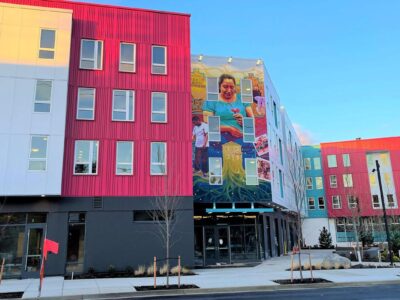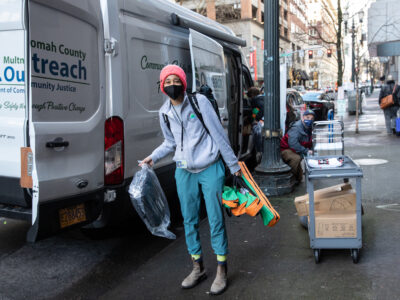Case Management & Access to Support Systems and Housing Services
Coordinated Access
Coordinated access describes how organizations, service providers, and government agencies coordinate care and support for individuals and households exiting homelessness into transitional or permanent housing. The JOHS coordinated access system maintains a centralized applicant and housing database and prioritizes access to transitional or permanent housing based on individual assessments.
Introduction
Keep scrolling down on this page for more information about coordinated access, how it works, and how to get started with a caseworker for services.
If you are experiencing homelessness and would like to be connected with a caseworker, please see the list of phone numbers/contacts below to connect to a caseworker for an assessment.
If you’re a community-based organization or service provider, find answers to common questions about the regional coordinated access system.
Learn about the Multnomah Services & Screening Tool (Coordinated Access Redesign)
Launched in October 2024, the MSST is shorter and easier to understand than the previous tool. The questions on the form are more trauma-informed. They align with local priorities. And they promote equity in access to available housing resources.
*Only trained assessors can complete the MSST. If you’re interested in becoming an assessor fill out the Google Form below.
What is coordinated access?
Coordinated access describes how organizations, service providers, and government agencies coordinate care and support for individuals and households exiting homelessness into transitional or permanent housing. The JOHS coordinated access system maintains a centralized applicant and housing database and prioritizes access to transitional or permanent housing based on individual assessments.
How does coordinated access work?
Coordinated access works as follows:
-
Connecting to CHAT hotline (see below)
-
Calling 211 or visiting 211info.org
-
Online application
-
Assessment at shelter
-
Agency referral
-
Client consents to release information
-
Conduct assessment
-
Chronically homeless
-
Vulnerability score
-
BIPOC community member
-
Elderly head of household
-
Lowering barriers
-
Help with documents
-
Culturally specific services
-
Long-term
-
Private market or newly built
-
Supportive services
How do I connect to a Coordinated Access Housing Specialist to get assessed?
Adults: Please contact the Coordinated Housing Access Team (CHAT) Hotline at 844-765-9384. You can also complete an online pre-screening by filling out this form.
For culturally specific assessments for the BIPOC community, you can call/email the BIPOC CHAT Line at 503-280-2600 x 654 or housingreferrals@ulpdx.org.
Veterans: Call the Veteran Services hotline at 855-425-5544.
Families: Call 211 for assessment.
Domestic Violence Survivors: Call to Safety 503-235-5333 or, for Spanish, Project UNICA 503-232-4448 (more info and resources for survivors)
Unaccompanied Youth (Under age 25): Contact Janus Youth through their Access Center 635 SW Alder St or 503-432-3986
Coordinated Access Tools & Resources
Coordinated Access for Adults and Families Policies
Guide to Conducting the Coordinated Access Tools
Coordinated Access Guidelines





